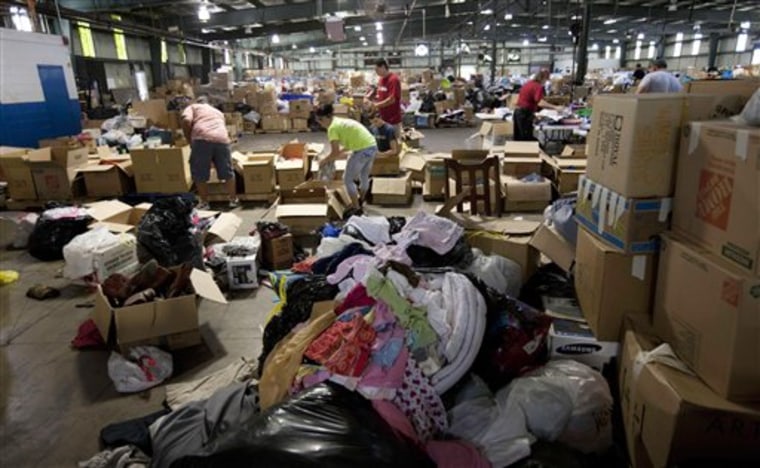Relief officials inundated with donations after the flurry of twisters that killed more than 300 people across the South are sorting through the broken toys and used underwear they don't need while hunting for places to store mountains of vital supplies like canned food.
Across Alabama, agencies are still encouraging people to send items like cleaning supplies for people clearing debris from tornado-damaged homes, or cash donations that can be used to cover operating expenses or handed out to victims. But with storage space scarce, most say they can't handle any more used toys or cast-off clothing.
"That becomes the disaster within the disaster," said Salvation Army spokesman Mark Jones. "When people make those mass donations ... it causes the community to be overrun with them and have to deal with that in addition to the storm damage."
In a dimly lit warehouse in Tuscaloosa, for instance, donated toys are piled 6 feet high as volunteers sort through hundreds of bags of old clothes. A 3-foot-tall plastic Santa Claus looks over the operation; volunteers say it came in with a load of contributions.
At a donation distribution center in the northwest Alabama town of Phil Campbell, volunteer manager Beth Rhea has baby food stacked almost to the ceiling, plenty of water and doesn't need any more clothes. But she could use some tents and camping gear because some victims are sleeping outside beside the rubble of their homes. In the central Alabama town of Eclectic, Mayor Helen Rowe has put out the word: No more clothing donations.
As for the Salvation Army, Jones said the agency only recently found warehouse space in hard-hit Tuscaloosa and still desperately needs new underwear, nonperishable foods, pet food and sports drinks. It's still searching for more storage space for things that won't be used right away.
Dozens of tornadoes whipped across the South on April 27, killing people across seven states and injuring hundreds more as entire communities were leveled. Donated water and food started arriving within hours in some towns; relief sites sprang up on street corners and in parking lots.
Temporary Emergency Services of Tuscaloosa County already has 10 warehouses full of donations, but too many of those items are broken toys, dirty stuffed animals and used underwear that has to be thrown in the trash, said agency director Karen Thompson. While the warehouse space was also donated, Thompson said storing all that stuff is still costly because the organization must pay liability insurance to cover the operation in case someone is hurt on the job.
"We just have so much," she said. "It's going to be needed long-term, but a lot of people don't have a roof over their heads and don't have anywhere to put things right now."
Canned food and cleaning products are urgently needed, she said, because some private homes have become impromptu shelters as families take care of relatives and friends left homeless by the twisters.
Vivian Gordon, whose apartment was destroyed by the twister that killed dozens in Tuscaloosa, has survived with the help of relatives, friends and even a stranger who picked her up on the roadside after the storm, providing her a place to sleep. Despite her need after losing everything, she has yet to visit a distribution site.
"I'm blessed. But I know other people have," she said.
Victims had come in droves to such distribution centers for water and hot food in the days after the storm. The lines are nearly nonexistent now, though, as stores that had been without electricity reopen and people find places to stay.
And that has left some centers overflowing. On a recent day in Tuscaloosa, truckloads of unneeded ice were left in the sun to melt. In the isolated East Franklin community in the Tennessee Valley, where donations have come in from as far away as Pennsylvania, garbage bags filled with clothes, boxes of waters, tables covered with canned goods and other items fill the gymnasium at the junior high school.
"There isn't any way I could tell you how much stuff we have in there," said Tony Hodge, who is supervising the distribution center.
At the Phil Campbell center, Rhea said people from as far away as Austin, Texas, have come to the town's senior citizen building, where items are being stockpiled. Workers didn't plan to take clothes at the center, but there are still piles of pants, shirts and other items in the large room along with toiletries, food, cleaning supplies and even comic books.
"We hate to tell people 'no,'" Rhea said. So any left over water, clothing, baby food and other items will be donated again, possibly sent to other parts of the state that may be short on supplies.
"We will box it all up, label the boxes and send them to another disaster," Rhea said.
